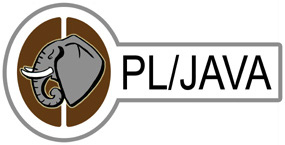
With some restrictions, PL/Java can be used in parallel queries, from PostgreSQL 9.6, and in some background worker processes (as introduced in PostgreSQL 9.3, though 9.5 or later is needed for support in PL/Java).
Because PL/Java requires access to a database containing the sqlj schema,
PL/Java is only usable in a worker process that initializes a database
connection, which must happen before the first use of any function that
depends on PL/Java.
Like any user-defined function, a PL/Java function can be
annotated with a level of “parallel safety”, UNSAFE by default.
When a function labeled UNSAFE is used in a query, the query cannot be
parallelized at all. If a query contains a function labeled RESTRICTED, parts
of the query may execute in parallel, but the part that calls the RESTRICTED
function will be executed only in the lead process. A function labeled SAFE
may be executed in every process participating in the query.
PostgreSQL parallel query processing uses multiple operating-system processes,
and these processes are new for each parallel query. If a PL/Java function is
labeled PARALLEL SAFE and is pushed by the query planner to run in the
parallel worker processes, each new process will start a Java virtual machine.
The cost of doing so will reduce the expected advantage of parallel execution.
To inform the query planner of this trade-off, the value of the PostgreSQL
configuration variable parallel_setup_cost should be increased.
The startup cost can be minimized with attention to the
PL/Java VM option recommendations, including class data sharing.
RESTRICTED/SAFE function behaviorThere are stringent limits on what a function labeled RESTRICTED may do,
and even more stringent limits on what may be done in a function labeled SAFE.
The PostgreSQL manual describes the limits in the section
Parallel Labeling for Functions and Aggregates.
While PostgreSQL does check for some inappropriate operations from a
PARALLEL SAFE or RESTRICTED function, for the most part it relies on
functions being labeled correctly. When in doubt, the conservative approach
is to label a function UNSAFE, which can't go wrong. A function mistakenly
labeled RESTRICTED or SAFE could produce unpredictable results.
While a given PL/Java function itself may clearly qualify as RESTRICTED or
SAFE by inspection, there may still be cases where a forbidden operation
results from the internal workings of PL/Java itself. This has not been seen
in testing (simple parallel queries with RESTRICTED or SAFE PL/Java
functions work fine), but to rule out the possibility would require a careful
audit of PL/Java's code. Until then, it would be prudent for any application
involving parallel query with RESTRICTED or SAFE PL/Java functions
to be first tested in a non-production environment.
A Parallel query and PL/Java page on the PL/Java wiki is provided to collect experience and tips regarding this significant new capability that may be gathered in between updates to this documentation.
README.parallel in the PostgreSQL source, for more detail on why parallel query works the way it does.